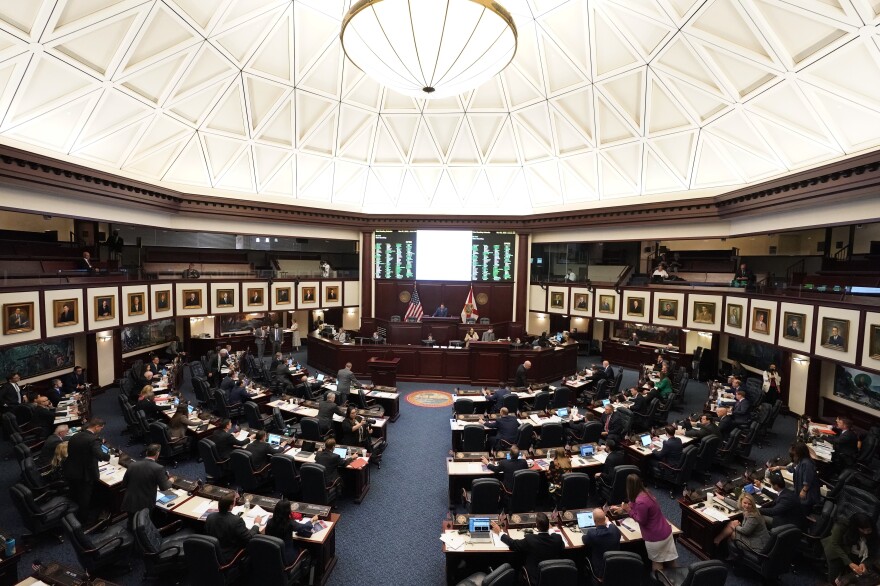House and Senate negotiators expressed optimism Monday as they began trading budget proposals, despite gaps in spending over issues such as public schools, land preservation and tourism marketing.
“I think we’re in great shape. We’ve been working really well with our House counterparts,” Senate Criminal and Civil Justice Appropriations Chairwoman Jennifer Bradley, R-Fleming Island, said. “Really, the biggest spend in our area of the budget is (the Department of Corrections). And we’ve made great progress aligning on a lot of those issues as well as a lot of the agency issues. So, I feel we’re well-positioned to make good progress during the conference (negotiations).”
Formal conference committees started meeting Monday to negotiate details of what is expected to be a record budget for the 2023-2024 fiscal year, which will start July 1. The budget for the current fiscal year totaled $109.9 billion, and House and Senate proposals are significantly higher for 2023-2024.
“We’re pretty fortunate … it’s been a pretty good financial year for the state,” House Infrastructure & Tourism Appropriations Chairman Alex Andrade, R-Pensacola, said. “So, it makes our jobs a little bit easier this year than other years.”
Lawmakers must resolve their differences by May 2 to be able to end the legislative session May 5 as scheduled. That is because of a required 72-hour “cooling off” period before lawmakers can vote on the final budget.
Conference committees on different areas of the budget swapped proposals Monday, with remaining differences expected to get bumped up to top House and Senate leaders later this week.
“I think we’re going to have a smooth conference,” Senate Transportation, Tourism and Economic Development Appropriations Chairman Ed Hooper, R-Clearwater, said.
“I think we’re in great shape. We’ve been working really well with our House counterparts.”Jennifer Bradley
Gov. Ron DeSantis is on an economic-development trip to Japan, South Korea, Israel and England, but Hooper said his absence this week won’t alter negotiations. DeSantis ultimately will have line-item veto power over the budget.
“He gets the last bite of the apple,” Hooper said.
Among issues resolved Monday, negotiators agreed to provide $75 million for the state Job Growth Grant Fund, which DeSantis can use for regional infrastructure projects. Also, they agreed to spend $20 million to continue offering $5,000 bonuses to recruit law-enforcement officers from across the country.
DeSantis had asked for $100 million for the jobs fund and $30 million for the bonuses.
Education budget negotiators also found some early areas of agreement.
House PreK-12 Appropriations Chairwoman Josie Tomkow, R-Polk City, said the House is backing $24 million to launch the Florida School for Competitive Academics. The school’s creation would be contingent on the Legislature passing a bill (SB 1386) sponsored by Sen. Keith Perry, a Gainesville Republican who is Tomkow’s Senate education budget counterpart.
But other differences remained, including a $100 million gap in funding for the Florida Education Finance Program, the main funding source for public schools.
The House made an initial offer Monday of about $26.76 billion for the program, which would represent a roughly $2.2 billion increase over the current year. The Senate has proposed $26.65 billion.
House education budget writers also are proposing $5 million for transportation grants to help carry out a bill (HB 733) that would require many middle schools and high schools to have later start times. The House has passed the bill, though critics have questioned its financial impact on school districts. The Senate has not addressed funding for the issue.
In the environmental area of the budget, the Senate is seeking $337 million to preserve land through purchasing conservation easements, which limit development while allowing ranching and farming operations to continue. The House has proposed spending $50 million.
To address sea-level changes, the House has proposed $300 million, while the Senate has pitched $179 million.
Senate Agriculture, Environment and General Government Appropriations Chairman Jason Brodeur, R-Sanford, called the land-preservation and sea-level proposals “great starting points.” But, he added, they might be among the biggest hurdles to clear by the end of the week.
“There's a lot of really big, great grant programs that we have that preserve Florida's lands. And so … the negotiation point is those really big buckets of how much we want to preserve.”Jason Brodeur
“It's probably going to be just how much money do we want to put into Florida Forever and the (Rural and) Family Lands program,” Brodeur said, referring to two land-preservation programs. “There's a lot of really big, great grant programs that we have that preserve Florida's lands. And so … the negotiation point is those really big buckets of how much we want to preserve.”
Meanwhile, the House and Senate have major differences over the Visit Florida tourism-marketing program.
The Senate has proposed spending $80 million on Visit Florida, up from $50 million in the current fiscal year, while the House has not proposed any state funding. The House has separately pushed a bill that would require local tourism agencies to provide money to Visit Florida.
The House also is looking to close the business-recruitment agency Enterprise Florida, moving many of its economic-development programs under the Department of Economic Opportunity. Hooper said the Senate is “close” to meeting the House on Enterprise Florida.
Meanwhile, the Senate didn’t propose funding for aviation and maritime equipment DeSantis requested to accompany a build-up of the Florida State Guard from 400 members to 1,500. The House proposed spending $55 million for equipment, of which $49 million would be for aircraft.
The two sides also were looking at DeSantis’ $7 billion “Moving Florida Forward” proposal, which would speed completion of 20 highway projects.
Under DeSantis’ proposal, $4 billion would come from a general-revenue surplus and the remaining $3 billion would be financed.
“We’re working on the right language to get us happy and him happy also,” Hooper said.





